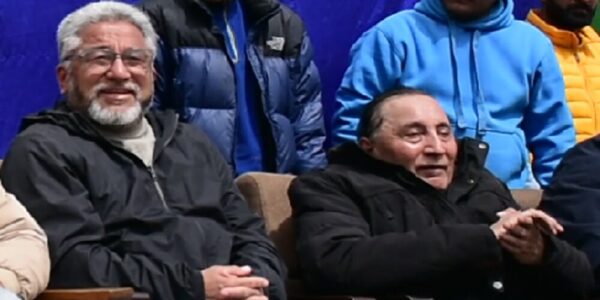Ladakh Democratic Alliance: A Tale of Strategic Unity and Political Maturity in Kargil
Over the past few days, a new name “Ladakh Democratic Alliance” has been circulating in news in connection to independent candidate from Kargil, Haji Hanifa Jan from Kargil. This recent development has left many people puzzled who are already bewildered by the rapid changes in political scenario like sudden appearance of a joint single candidate from Kargil and the mass resignation of NC members from the Kargil unit. However, within the local political context of Kargil, this development holds significant historical weight. What stands out even more is the display of political maturity exhibited by Kargil’s top leadership this time around.
At the outset of selecting a candidate from Kargil, the leadership faced several challenges. Firstly, following a recent three-day hunger strike advocating for Statehood and Sixth Schedule status, the people of Kargil expressed a strong desire for the Kargil Democratic Alliance to nominate a unified candidate for the Lok Sabha election. Secondly, in its endeavor to select the candidate, the KDA confronted the risk of compromising its integrity should it fail to rally all stakeholders behind a single nominee. Moreover, it was imperative to preserve amicable relations with the leadership in Leh to uphold the four-point agenda of Ladakh.
As the process concludes, Kargil’s leadership has accomplished all objectives without compromising on any of the three priorities. An analysis of this successful endeavor and its underlying strategy would prove insightful.
* Click to Follow Voice of Ladakh on WhatsApp *
The initial strategy involved a deliberate delay in commencing discussions on candidature, aimed at minimizing the time available to various stakeholders, particularly those intent to spoil the process, to influence the playing field. When discussions did commence, priority was given to political parties, recognized for their maturity in navigating political stalemates, rather than other stakeholders such as faith organizations and civil societies.
Meanwhile, Kargil had a rare opportunity to secure the endorsement of the Indian National Congress (INC), a prominent national-level party within the major National Alliance, of which both the Jammu Kashmir National Conference (JKNC) and INC were members. However, in contrast, the local unit of the National Conference sought to field their own candidate, fearing that their supporters would not rally behind the Congress candidate. This situation called for sacrifice from the top Congress leadership.
Asgar Ali Karbalai, who had previously contested and lost in the 2019 Lok Sabha election, had a golden opportunity to secure victory with the Congress endorsement. However, in a gesture to maintain unity, he relinquished the mandate and offered the National Conference unit the opportunity to select a candidate under the Congress endorsement. This decision facilitated consensus between the two largest political parties on a single candidate. Had political players failed to reach consensus on a single candidate, the matter would have likely shifted to faith-based institutions, potentially repeating the scenario of 2019. Thanks to Karbalai’s decision to pass the mandate to a JKNC member, this threat was averted.
The situation also involved a rivalry with the Congress unit of Leh district, which was vigorously vying to secure the Congress party’s mandate for Leh. The proposal of a National Conference (NC) candidate under the Congress endorsement provided a compelling argument for them to sway the decision of the Congress high command in favor of the Leh Congress unit. Asgar Ali Karbalai, one of the Co-Chairman of the Kargil Democratic Alliance and a Congress leader, traveled to Delhi to advocate for Kargil’s interests with the Congress high command. The entire Ladakh region anxiously awaited the decision of the Congress high command, with both the Kargil and Leh Congress units hoping to secure the mandate for themselves.
On the flip side, the other Co-Chairman, Qambar Ali Akhoon, aligned himself with both the Congress and NC units of Kargil to officially announce Haji Hanifa Jan as their joint candidate, regardless of the Congress high command’s decision. However, during the entire press conference, they tactfully avoided explicitly stating it as a decision of the Kargil Democratic Alliance (KDA), although the active participation of both Co-Chairmen of the KDA made their stance abundantly clear.
In this approach, some stakeholders who wanted to spoil the case hesitated to challenge the decision; on the other side KDA’s integrity also remained safe. And most importantly they fielded only one candidate on the ground.
If they had initially proposed Hanifa Jan as the KDA’s choice, they would have limited their ability to garner votes from the Leh district. Therefore, at this juncture, they explicitly named it the “Ladakh Democratic Alliance,” a moniker reminiscent of the “Kargil Democratic Alliance” but with a broader appeal to voters in Leh. This display of political acumen by Kargil’s leadership is sure to be lauded in history.

0 Comments